Top 10 Sports Nutrition Myths and FAQs
- April 29, 2020
- Last Updated: March 4, 2025
- 20 Comments
- Sports Nutrition
Wondering if the way you go about your fueling is actually evidenced-based and best for your sport? I’m breaking down the Top 10 Sports Nutrition Myths throughout this post to help you refine your nutrition plan for running or other exercise.
As we continue to publish podcast episodes and update our Nail Your Nutrition course content, I’ve been asking you guys about what you’re unclear about and what you want to know when it comes to fueling.
I’ve compiled some of the many questions and myths here so you can reference them in one place. If you have any to add to the list, comment below!
If you’re looking for information specific to sports nutrition and intuitive eating, check out the Runner’s Guide to Intuitive Eating!
A DIETITIAN IN YOUR POCKET?!
Are you always hungry?! This is the sports nutrition resource you’ve been missing in your training and every day life. Here’s you can make sure you’re eating enough for daily life, performance and recovery. – grab it now!
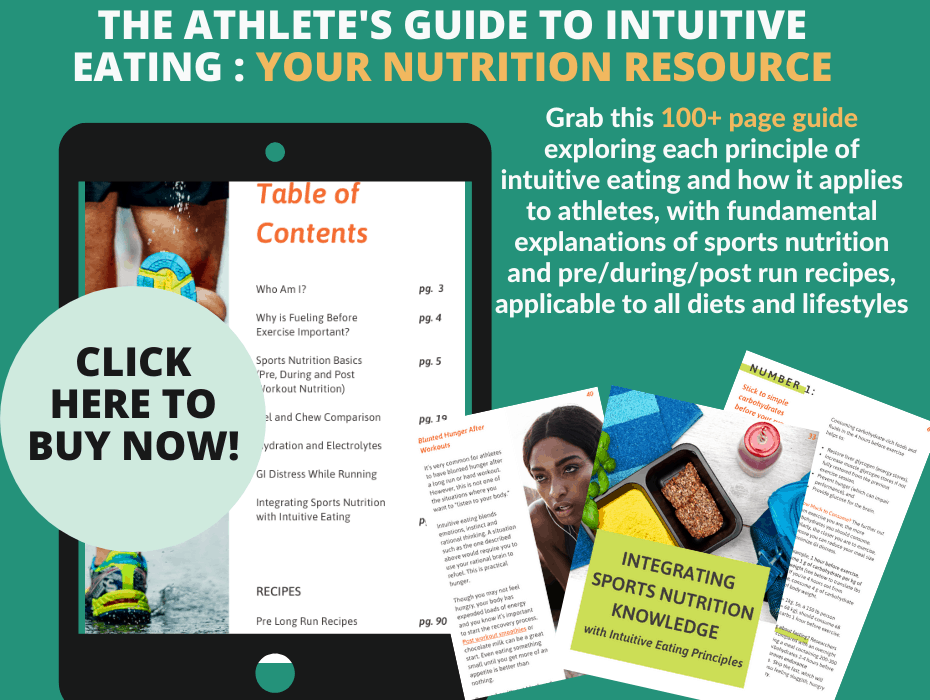
1. You Need To Eat Right After You Finish A Workout
The window of opportunity after a workout refers to the period where your muscles are most receptive to taking up fuel. For the longest time, we preached it was 30-60 minutes.
Newer research is showing that the window may be extended, but that being said, I always tell my clients to get fuel in sooner rather than later. Especially if you have a secondary workout later in the day, or an early morning workout the following day.
Generally speaking, I would caution within that first hour to get some carbohydrates and protein in, if possible. We want to start the recovery process, muscle building, glycogen restoration, and provide anti-inflammatory antioxidants.
We have a whole Nail Your Nutrition podcast episode on this!
What If It’s Been Hours Since You Last Ate?
How soon after your workout you need to fuel will also be dependent on how long your workout was, the intensity, and whether you ate before or during. If it’s been hours since your last meal or snack, you should eat ASAP.
If you didn’t eat an adequate pre-workout snack or enough snacks during a workout (if it was long and/or intense), you’ll definitely want to get your post-workout fuel in sooner.
Our bodies continue to repair and rebuild muscle for the next 24 hours, so that being said, you’ll want to have regular meals every few hours (which you should be doing anyway).
Even just starting with an easy energy bar can speed up the recovery process.

Plus, if you wait too long to refuel, you may find yourself ravenous and wanting to eat everything in sight. The food is going to help you recover quicker and may help decrease soreness and inflammation the following day (when *hanger sometimes strikes).
If you suffer from runners stomach, or have trouble feeling hungry right after a workout, try some of these ideas:
- Energy bars made with superstarch
- Soup (easy to sip on, and often high in sodium, which can be great for rehydration!)
- Smoothies – More often than not, these are easy to sip on. I recommend adding nutrients in them, though! Oats are easy to thicken and add more carbs, or add in some beets or sweet potatoes in this sweet potato beet smoothie for some extra carbs and nutrients.
- Juice, lemonade, sports drink – simple sugars are great for post-workout nutrition because they are absorbed quickly! Just what you want. Note that most of these options don’t have sufficient protein so you’ll need to pair.
- Cereal and milk
- Gummies, fruit snacks
- Popsicles
- Fruit – Oftentimes, these are easier to get down because they are high in water too, and our bodies know we need to hydrate.
2. You Should Only Eat Protein After a Workout
Protein is one part of the post-workout fueling equation, and to meet protein needs for runners, protein should be spread throughout the day.
Is it good to drink protein shakes after running? Yes, getting protein in post workout is important. However, you also need carbohydrates.
Why? You want carbohydrates because they are the quickest source of fuel for your muscles. We store carbohydrates in our muscles as glycogen.
During long endurance or high-intensity workouts, we can deplete this glycogen, so it’s very important to replenish it for subsequent workouts.
By eating carbohydrates, we also help reload our muscles for our future bouts of exercise. After a workout, our bodies are more apt to store carbohydrates as glycogen (we produce more of an enzyme that helps with this).

Cells are also more sensitive to insulin after a workout, which basically means that the insulin can act to move the carbohydrates from the blood into the muscle cells.
Alternatively, if we don’t take in sufficient carbohydrates, our body will start using protein as fuel and energy, and to do this, it has to break down our muscles. So, replenishing glycogen stores can, therefore, spare muscle protein.
We want to eat enough of all of the macronutrients to prevent relative energy deficiency.
Furthermore, even if you don’t find yourself in an intense training regimen/cycle, you still want to be eating enough in the off season to prevent muscle breakdown.
Off season nutrition is important!
How Much Protein Should I Eat Post Workout?
Protein (made of amino acids) is great for (re)building muscle tissue. So, after we’ve broken down muscle during a workout, we want to resynthesize and repair it.
One particular amino acid that helps with muscle synthesis is leucine, which is found in whey (dairy) products, beef, chicken, fish, pork, nuts and seeds.
Runners should aim for 20-30 grams of protein in their post-workout meal, and in subsequent meals as well (as the cells continue to repair and synthesize muscle). More is not necessarily better, as our bodies can’t really break down or absorb more than 30-40 grams at one time.
What’s more important is making sure you’re eating adequate protein consistently, and throughout the day.
A scoop of this protein powder (i love the superstarch!) and other smoothie ingredients would put you in this window.

3. I Only Need To Take Fuel In During or After Long Runs
Technically, we say anything over 60 minutes is constituted a “longer workout” and may require fueling throughout as glycogen stores run out.

HOWEVER, that doesn’t mean that you don’t need a snack during after a shorter run or workout. I like to look at the bigger picture:
- Did you have a sufficient pre- workout snack? If not, when was the last time you ate? (If it’s been 2-3 hours, you should eat a post workout snack and you may even need a snack during your 45 minute long run)
- Are you hungry? If so, honor your hunger and have a snack!
- Do you feel tired and lethargic during your run? You may want to consider some liquid or gummy carbohydrates (or make your own tart cherry gummies).
- If you can’t stomach fuel, add this to your water!
Remember, there are some guidelines for when and how to handle post-workout nutrition, but you know your body best.
If you’re hungry, eat something. If you have a busy day later, eat something now so your muscles can start the repair process, and you have sufficient energy and glucose on bored to function optimally.

4. Coconut Water Is Better Than Sports Drinks For Hydration
Coconut water is the clear liquid inside a coconut. It is typically lower in carbohydrates and sodium than most sports drinks. While it does have more potassium than sports drinks, we lose more sodium than potassium in our sweat.
Coconut water touts it as a magical food to replace electrolytes, but sodium is the main electrolyte we need for replenishment and it’s actually quite low in sodium.
An 8-ounce serving of Harmless Coconut Water has 60 calories, 15 grams of carbohydrates, 40 mg of sodium and 540 of potassium.

In contrast, Gatorade Thirst Quencher, a popular sports drink, has 70 calories, 135 mg of sodium (more than triple), 18 grams of carbohydrates and 40 mg potassium per 10 ounce serving. It does have more sugars, but they also offer lower sugar options.
Personally, I love the UCAN hydration packets. Delicious and no added sugars.
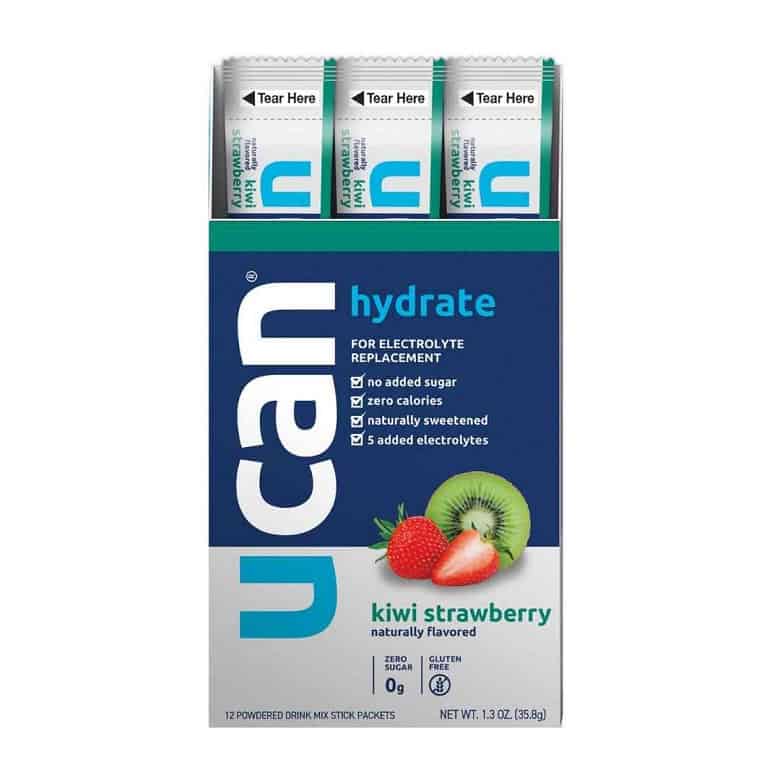
5. I Have To Eat Alot of Meat To Build Muscle
You can build muscle without following a meat-based diet. First off, make sure you’re eating enough. If you’re not eating enough calories, the body won’t build muscle, it will break it down instead.
The amino acid, leucine, as mentioned above, is great for muscle synthesis – so foods like dairy, eggs, chicken, pork, fish, beef, soybeans, nuts and seeds are important to include regularly.
Also, eating in the appropriate post-workout window and at regular intervals throughout the day will help so your body is never in a deficit.

6. I Can’t Get Everything I Need on a Vegetarian or Vegan Diet
Not necessarily true. It does take more planning and effort to meet vegetarian and vegan sports nutrition needs, but it can be done.
There are some nutrients of concern for athletes following a vegan or vegetarian diet, primarily:
We go through EACH of these and more in our course module on nutrients of concern for vegan sports nutrition needs because it is very important to cover your bases and know what helps vs hinder the absorption of certain nutrients.
I have a whole post on vegetarian nutrition.

Here are some plant-based meal and snack options that can provide the above nutrients:
- edamame + fruit
- sweet potato, quinoa and beet breakfast scramble
- Vegan sweet potato kale hash
- eggs or this breakfast skillet (This does have meat, but can be made without meat and substituted with tofu/tempeh)
- Quinoa Salad or Cheesy Quinoa (substitute with nutritional yeast if vegan)
- PB toast or PB&J (yogurt optional)
- Peanut Butter Coffee Smoothie
- roasted chickpeas + fruit
- Sweet Potato Cookie Dough Dip
- Cheese and fruit
- Chocolate milk, using soy or pea protein milk + chocolate syrup
7. I’ll PR If I Cut Carbs
Carbohydrates are the quickest and most efficient fuel for our cells and working muscles. They help power fast twitch muscles, PR’s and speedwork. When our muscles run out of glycogen (the storage form of carbohydrates), we can’t hit higher intensities (Thomas. Erdman, Burke).
You’ll start to feel tired, fatigued and likely even slower to recover without adequate carbohydrates.
For high training volume: glycogen stores are maximized by following a high-carbohydrate diet (8–12 g of carbohydrate/kg/day). Stores are depleted most by high volume exercise.
Another con to “cutting carbs” is that it’s usually a temporary thing. So, whenever you do add carbohydrates back in, you’ll probably experience some GI distress, bloating and discomfort as your body gets used to fiber again. It’s also normal for weight to go back up temporarily because carbohydrates store water in the muscles (which is great for training).
8. Athletes Should Avoid All Sugars
This is a big misconception. Firstly, it helps to quantify what sugars are – they are carbohydrates, the quickest and most efficient energy source for the body. Added sugars are more likely to be classified as “simple carbohydrates,” which just means they hit the bloodstream faster, and hence can be used quicker by the body.
This is a good thing for athletes!

Now, obviously there different kinds of sugars, such as are natural sugars and added sugars. I’m not telling you to load up on added sugars all day from processed foods, sweets and candy. But, just sharing that they can have a purpose for activity.
Natural sugars, like those found in fruit, are also beneficial for activity, and also come with a slew of other nutrients, like vitamins, minerals and antioxidants.
Fruit is sugar. So, by avoiding all sugars, athletes would be missing out on easy carbohydrate sources, as well as some sources of fiber, vitamins and minerals.
Rather than looking at sugar as “black and white” and “bad,” see it as just a part of the foods you eat and maybe enjoy. Food flexibility is powerful. It can certainly be part of a healthy diet and fueling plan.
If you do suffer from a sensitive stomach with sugars, try UCAN’s products that are made with superstarch!
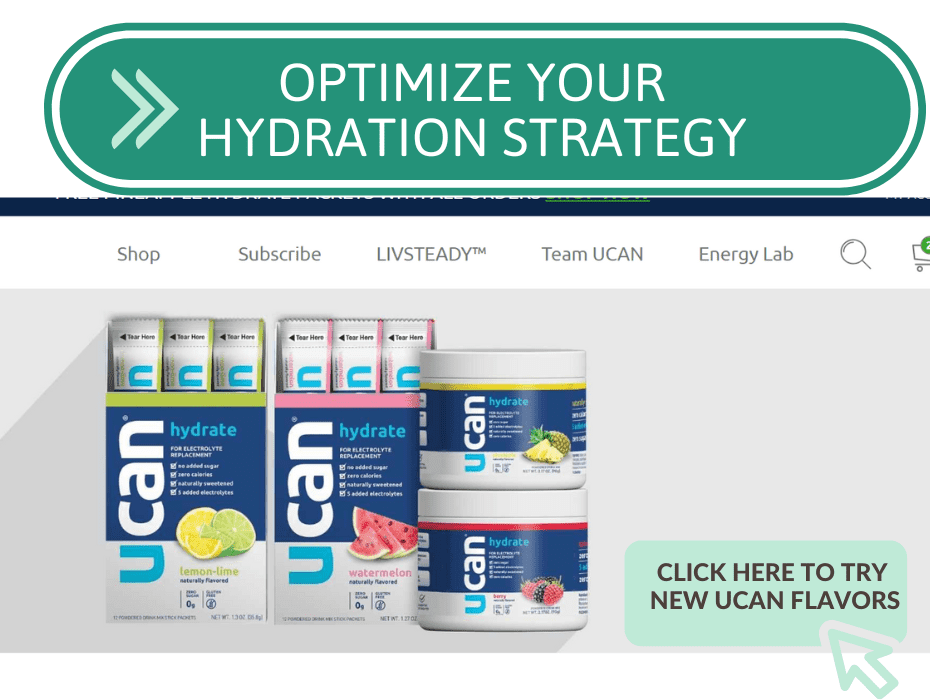
9. Too Much Protein Will Make Me Bulky
We have research showing that endurance athletes actually need MUCH more protein than we once thought, even as high as 1.65-2.6 g/kg/day for the 24-hour period post-exercise (Bandegan, et al).
Most endurance athletes have not prioritized protein in this way (I sure didn’t, in the past).

Protein has many roles to fulfill in the body, such as:
- The growth and repair of virtually all cells and body tissues—from your skin, hair, and nails to your bones, organs, and bodily fluids.
- The creation of enzymes, antibodies, transport and storage, and messengers.
- It’s required to support muscle, the immune system, and the brain. We need protein to ensure our bodies function optimally.
- If we don’t get enough protein, our bodies won’t be able to rebuild properly and we’ll start to lose muscle mass, and be breaking down body tissue and muscle instead of building it up.
Many protein-rich foods are also providing necessary micronutrients, like iron, zinc, B12 and calcium, to name a few.
It’s actually quite difficult to bulk up without doing loads of weight lifting and strength training, and a lot will be determined by your body type.
It’s also important to note that women and men and teenagers and adults have very different nutrition needs. Here’s a post on nutrition for teenage athletes.
10. You Need to Drink 8 Cups of Water Every Day
This is a very outdated recommendation that is actually likely quite low for most athletes. We all have different hydration needs that depend on many factors. Some factors include:
- Altitude
- Weather, seasons, heat/humidity – I have helpful posts on summer hydration and tips to avoid winter dehydration
- Training intensity and duration
- Lifestyle – nursing, pregnant, postpartum will require more. This post about tips about returning to running postpartum may be helpful.

Rather than giving a blanket recommendation (which is certain to be different based on the athlete), I think it’s more helpful to be more familiar with signs of dehydration. Signs such as headaches, fatigue, dry skin, rapid heartbeat, concentrated dark urine, and confusion are just some signs
Athletically, you’ll also experience extreme fatigue during workouts if you’re dehydrated, decreased performance and intensity, higher heart rate, and may experience head or neck heat sensations.
Remember that you don’t just have to drink water to hydrate – there are also hydrating fruits and veggies, greek yogurt smoothies, sports drinks, coffee and tea, and soups all count too.
Resources:
Bandegan A, Courtney-Martin G, Rafii M, Pencharz PB, Lemon PWR. Indicator amino acid oxidation protein requirement estimate in endurance-trained men 24 h postexercise exceeds both the EAR and current athlete guidelines. Am J Physiol Endocrinol Metab. 2019;316(5):E741–8.
Thomas T., Erdman K.A., Burke L.M. (2016). Position of the Academy of Nutrition and Dietetics, Dietitians of Canada, and the American College of Sports Medicine: Nutrition and Athletic Performance. Journal of the Academy of Nutrition and Dietetics. 116(3): 501-528, https://doi.org/10.1016/j.jand.2015.12.006
As an Amazon Affiliate, I may earn from qualifying purchases. This does not change your price of purchasing, it just helps me reinvest in the blog so it can remain free to you. Thank you!
Support Bucket List Tummy





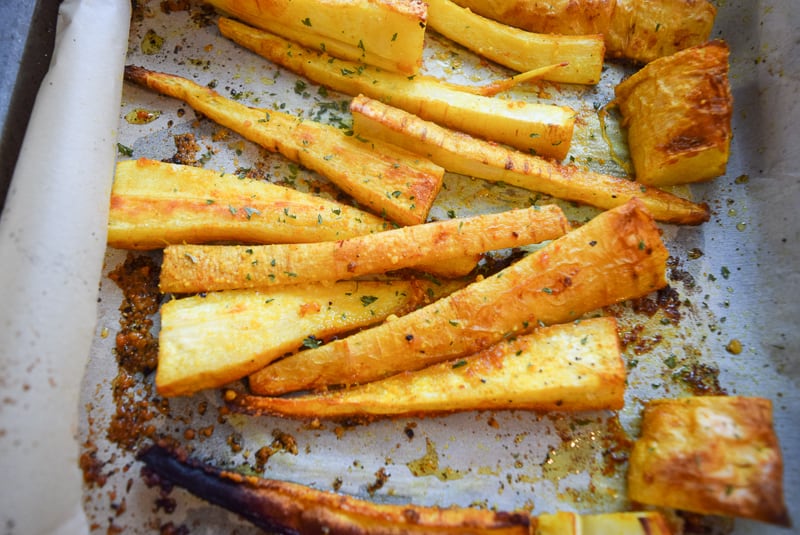
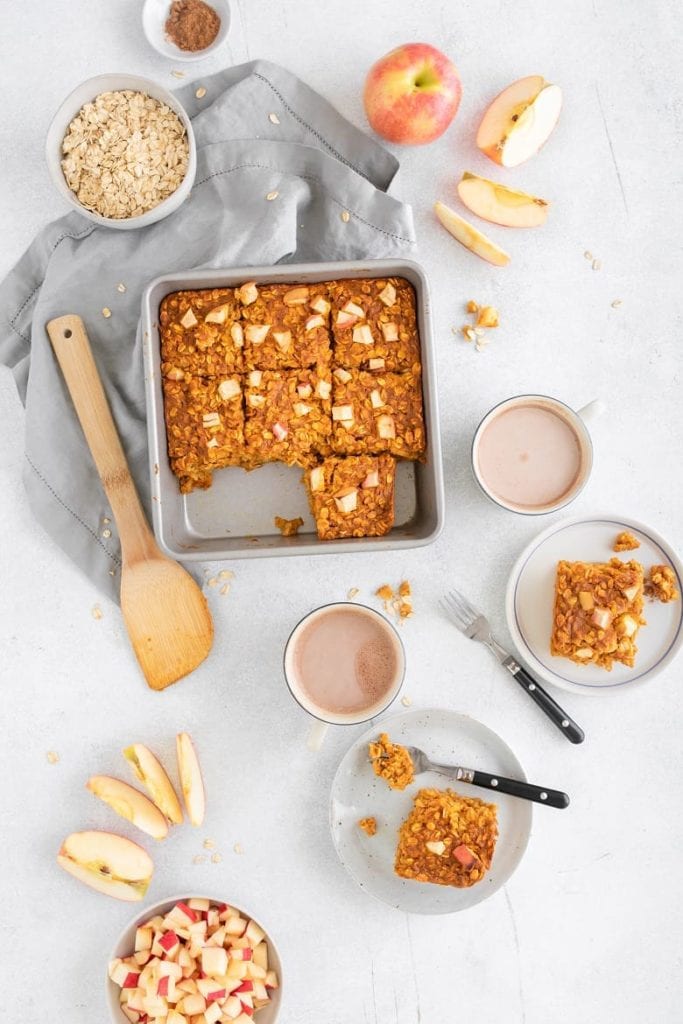


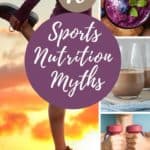
Like This Content?
Support Bucket List TummyThank you, Sarah…lots of good information here!
You’re very welcome!
“I’ll PR if I cut carbs” ???????? does anyone actually believe this? Oy. Great post- these informational cited ones are my favorite. Question: what is an “endurance athlete?” Does that means someone training for a marathon or longer? Half marathon? How many miles/hours per week of moderate training? Thank you!
You’d be surprised how many athletes are hopping on the low carb train! I typically classify endurance athlete as someone who is training for a half marathon or above, or who practices with longer runs and/or workouts over 60-90 minutes regularly.
I used to not eat right after morning runs and waited until after stretching and showering. I found myself ravenous later in the day. Since I took your nutrition course, I’ve started eating just a little bit of carbs right after and it’s helped so much! Usually I’ll grab a bowl of granola but sometimes it’s just a handful of pretzels, it works though.
I’m glad you including some other snack options! It can be so easy to get stuck in a rut and just grab the same food.
How soon after a workout do you have to eat? I feel like that’s never mentioned or nothing is really clear about it. Thanks for all of the info Sarah!
It really depends on the workout but if you’re hungry, always eat! As mentioned, the window may not necessarily close but I always say better to get stuff in sooner rather than later, especially for a long/hard workout
Great info Sarah! Love your site redesign too 🙂
Thank you Sarah!
I love a slice of cinnamon raisin toast topped with almond butter, cottage cheese and blueberries!!!
That combination sounds wonderful!
It’s tough to refuel post long run, but I’m learning it’s so important to get those nutrients in; I like to do a big yogurt bowl or chips for salt at first.
Great job, Emily!
Love this post! I’m all about getting in some carbs and protein after my workouts. My favorite for shorter workouts is eggs and toast or protein oats. After long runs, I’m all about a smoothie!
Thanks for this! I love a big bowl of cereal after a long run — I usually top with some pb2 or protein powder and frozen fruit.
I’m a cereal person too – love the mix of crunch and milkiness!
Awesome fitness tips! Thanks for sharing
I like eating bananas and honey stinger waffles before shorter workouts, and oatmeal before longer ones. If I don’t feel like eating after a workout then smoothies usually work well! I usually have to balance figuring out what I want to eat and what I have the energy to make.
Yes – sometimes energy can be lacking after a long run, I try to keep easy things on hand.